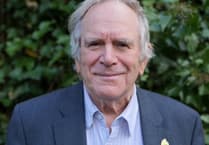I was contacted recently by Jason Griffiths of the Dean Heritage Centre in respect of Ralph Anstis’ great novel ‘Let the Hero be the Hungry Man’, about a Forest miners’ strike in the 1870s. Our conversation wasn’t really about the book, but about the play that Ralph developed from the novel. In the play, all external persons, including the mine owners, were removed from the action, so that the focus could be entirely on the mining household and the effect of a strike on the local community. Concede to a savage cut in wages or strike to hold out for no cut? The theme was not so much about greedy mine owners but on the various community reactions to a situation of great uncertainty.
The play was set in Parkend, and was appropriately performed by Parkend Players at Parkend Memorial Hall. It was sold out at every performance, with celebrated Forest writer Winifred Foley as well as Ralph Anstis and his wife Beth, in an audience at one of the performances. The story behind the development of the novel into the play is the reason for my contact by the Dean Heritage Centre.
The Dean Heritage Centre, with the University of Gloucestershire and other partners, has been awarded a substantial grant from National Lottery Heritage funds to establish a Forest collection of local literary documents, which includes an archive of Berry Hill television dramatist Dennis Potter’s works, to conserve them and make them available to the public. A previous project was a weekend programme of events celebrating the book ‘A Fortunate Man’, which is an atmospheric study of the life of St Briavels doctor John Eskell, by John Berger, with powerfully evocative photographs by Jean Mohr.
The reason for my call from Jason was to identify any documents I might have relating to the dramatic form of ‘Let the Hero Be the Hungry Man’ which might be an interesting addition to the Heritage Centre collection of literary documents. Sadly, I no longer seem to have a copy of the script of the play or of the programme, but I have kept a record of correspondence with Ralph Anstis, cast members and the Parkend Players which show how the script was developed and describes the process of transforming a novel into a dramatic work.
I have made all the documents that I do have available to the Dean Heritage Centre, who seen to find them of interest and will be generously returning a photocopy of them to me, while keeping the originals for the Dean Heritage collection. If anyone has a copy of the script, the performance programme or any other useful information about the development of the play from the book, then I’m sure that Doctor Jason Griffiths at the Dean Heritage Centre at Soudley would be very keen to hear from you.




